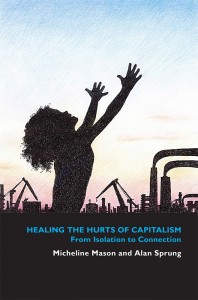
|
|
|
Healing the Hurts of Capitalism From Isolation to Connection How do we break old habits and routines that stop us making progress? In organising politically, how do we escape ways of doing things that are either self-defeating or out of date? Those involved in radical politics frequently put their heads in their hands in despair as old habits die hard – too often they are as destructive as ever. Or attempts to break the mould seem as eccentric and counter-productive as the patterns they would replace. It seems that we are on rails, travelling to a destination that has already been determined. How to escape? Let’s open the book and see what Micheline and Alan suggest … Ken Loach – Film maker Micheline Mason is an artist, writer and activist. For over forty-five years she was part of an international organisation of people who developed a simple but profound way to help each other to recover from past emotional injuries. In this community she helped develop the theory and became a teacher of the method, exchanging attention with thousands of people in many different countries. In her ‘retirement’ she has chosen to share what she learnt with as many people as possible with a view to empowering them to continue the work themselves. She lives in London. |
Reviews...
Thoughtful and Different
Healing the Hurts of Capitalism offers an interesting explanation of why the capitalist system remains the status quo and why attempts to change it result in failure. Rather than dwelling on economics and politics it tackles the downside of capitalism from the standpoint of our own psychological distress ‘patterns’. Patterns are entrenched behaviour patterns which result from past hurts and they dictate our responses to the world around us and to our own relationships and situations in ways that are less than appropriate or helpful. ‘Patterns’ such as the pursuit of excessive wealth, compulsive shopping to make us feel better, addictions, fearing people different from ourselves, competitiveness, feelings of isolation and powerlessness are bad for us as individuals but en masse they prevent our own growth and the growth of civilisation into something more humane, more sustainable, more cooperative and more equal. A good and interesting read and very accessible unlike many books on the subject.
Susan Harris - Great Read
Wow what a brilliant book and it is written in very accessible way. It has a new approach using a diverse group of peoples personal experiences and thinking to illustrate the impact of Capatalism in their lives.. This makes it a a wonderful alternative to the academic explanations. It brings clarity to the complexities and mechanics of the present system and offers ways to support each other to build a better society.
Stefan Szczelkun
Many of us who have experienced peer counselling, or perhaps have been through a process of recovery from addictions or trauma with the intensive use of professional counselling, have a political insight into the way that the forces that hold our class system together are embedded in us from an early age. The political landscape is founded on feelings of superiority and inferiority that don’t seem to be accessible to rational analysis or challenge.
There are many thousands of people scattered through the population that have acquired these insights over the last 30 or 40 years but communicating them to the rest of the world has not happened. Part of the difficulty may have been that the knowledge gained through live and emotionally charged interaction does not translate into words on a page or screen. The clever thing that the authors of ‘Healing the Hurts of Capitalism’ have done is to base their book on transcriptions from a series of listening workshops in which the participants respond to questions about their experiences in relation to capitalism. The many quotations from these workshops give the reader an stronger idea of the process that is being proposed. In fact the book ends with a chapter on how to set up a successful listening group.
The idea is to infuse grass roots politics with a process of communication that could liberate us from the stultifying effects of the everyday oppressions we have been subject to and that have limited our power. Its an ambitious book that is written in very accessible language. I’d recommend it to anyone who wants to find a more caring form of political practice.
|
Books by Micheline Mason... An Ordinary Baby Healing The Hurts of Capitalism The Phenomenon of the Human Distress Pattern |